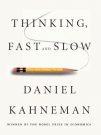More on Statism
The most recent edition of the Liberty Forum involves a discussion of behavioral law and economics, the subject of a couple of my posts on statism. See here and here. In these posts, I noted that most economists simply applied the new insights into cognitive bias to market actors but not to government actors. Happily, Josh Wright and Doug Ginsburg (as well as some of the commentators) do not make this error but apply the challenges to rationality to government actors as well:
Behaviorists [also] tend to underestimate the costs of implementing proposed policies—an error we term the “government intervention bias.” If one believes individuals are predictably irrational and will commit decisionmaking errors, then the relevant policy question is whether society is better off if error-correction is supplied by individuals in markets or by individuals in the government. It is unclear that either bounded rationality or outright irrationality supports a larger role for government in error correction, but more government is inevitably the policy prescription favored by the behaviorist agenda. The pro-government position suffers from two underlying problems.
First, we question the behavioral economist’s implicit assumption that regulators are rational. As Judge Posner pertinently inquired: “Behavioral economists are right to point to the limitations of human cognition[, b]ut if they have the same cognitive limitations as consumers, should they be designing systems of consumer protection?”[15] In response to Judge Posner’s question, Thaler posits that regulators’ bounded rationality is defensible because even “imperfect experts can help us achieve better outcomes, just as imperfect judges can help us enforce the law fairly.”
Thaler’s response proceeds from the Nirvana fallacy and hence misses the critical point: Neither governments nor individuals can make error-free choices. The pertinent question concerns their comparative performance. How costly will government policy errors be if government actors suffer from, say, hyperbolic discounting or status quo bias? What will be the frequency and magnitude of those errors relative to relying upon private decision-makers to correct their own errors? By casting the issue as whether people err—which no one could dispute—Thaler ignores the more subtle and fundamental points about the consequences of the choice to rely upon the government rather than private decisionmakers to correct errors. The counterintuitive presumption that irrationality among regulators is irrelevant consistently biases cost-benefit analysis in favor of government intervention.
Second, the behaviorists’ government intervention bias depends upon their systematic underestimation of information costs. Behaviorist prescriptions for intervention assume regulators are able to recognize, gather, and process the data required to identify each individual’s “true preferences.” Their implicit assumption is that regulators enjoy a comparative advantage over private economic actors in acquiring information. Mario Rizzo and Douglas Glen Whitman describe this obstacle to welfare-increasing behavioral interventions as the “knowledge problem” of behavioral law and economics, derived from Hayek’s well-known critique of central planning.
The entire piece as well as those of the commentators are well worth reading.
